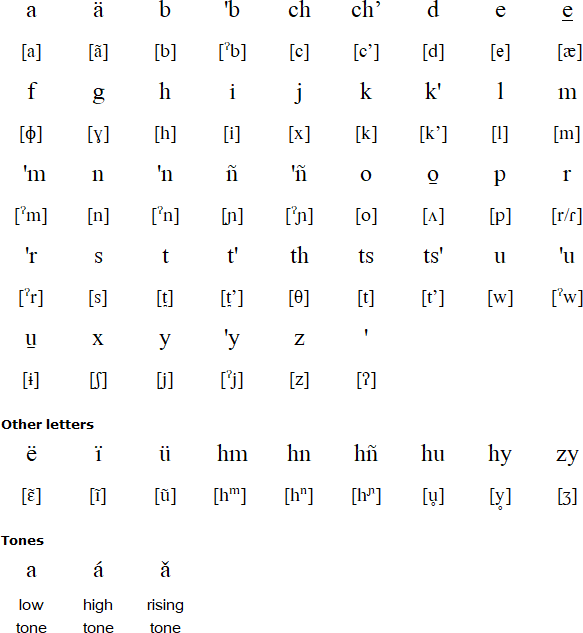Otomi is an Oto-Manguean language spoken by about 240,000 people in central Mexico, especially in the states of México, Puebla, Veracruz, Hidalgo, Guanajuato, Querétaro, Tlaxcala and Michoacán.
There are many different dialects of Otomi, some of which are mutually unintelligible, and each one has a different native name for the language, including: Hñähnü, Hñähño, Hñotho, Hñähü, Hñätho, Yųhų, Yųhmų, Ñųhų, Ñǫthǫ and Ñañhų. Most of these mean "speak well". The name Otomi comes from the Nahuatl otomitl, which is thought to come from totomitl (shooter of birds).
Otomi was first written by Spanish friars after the Spanish conquered Mexico during the 16th century. The friars taught Otomi speakers to write their own language using the Latin alphabet, and several books were composed using their spelling system. The language in which they were written is known as Classical Otomi. Since then many Otomi have abandoned their language and switched to Spanish, partly due to negative stereotypes about them perpetuated by Nahuatl and Spanish speakers. Attitudes began to change in 2003, however, when Otomi gained recognition as a national language of Mexico along with 61 other indigenous languages.
A standard way to write Otomi by on the Mezquital variety of Otomi was published by the Instituto Nacional de Lenguas Indígenas (INALI) in 2014.
This pronunciation is for the Otomi spoken in the Valle del Mezquital, the most widely-spoken variety of the language.

Gotho nu kja'ni i mu̱i ra zoo i gotho ro kuchti, i tu'ni nu ro ña padä bini i da budi, da mu̱i ra zoo koyu gotho yu kja'ni i yo kuadi.
All human beings are born free and equal in dignity and rights. They are endowed with reason and conscience and should act towards one another in a spirit of brotherhood.
(Article 1 of the Universal Declaration of Human Rights)
Phrases supplied by Jose Armando Fernandez and in Mezquital Otomi
Information about Otomi | Numbers (Sierra Otomi)
Information about Otomi languages
http://en.wikipedia.org/wiki/Otomi_language
http://www.native-languages.org/otomi.htm
http://www.famsi.org/research/boot/neve_y_molina_1767/
http://www.archive.org/details/rosettaproject_ote_phon-1
http://www.proel.org/index.php?pagina=mundo/amerindia/otomangue/otomi
https://www.otomi.com.mx/
Chinanteco, Chatino, Mazahua, Mazatec, Mazatec (Chiquihuitlán), Mazatec (Jalapa), Mixtec, Mixtec (Chayuco), Mixtec (Coatzospan), Otomi, Otomi (Acazulco), Otomi (Sierra), Otomi (Temoaya), Tlapanec, Triqui (Chicahuaxtla), Triqui (Copala), Triqui (San Martín Itunyos), Triqui (Santo Domingo del Estero), Zapotec (Aloápam), Zapotec (Choápam), Zapotec (Güilá), Zapotec (Isthmus), Zapotec (Miahuatlán), Zapotec (Rincón), Zapotec (San Dionisio Ocotepec), Zapotec (Zoogocho)
Languages written with the Latin alphabet
Page last modified: 14.04.24
[top]
You can support this site by Buying Me A Coffee, and if you like what you see on this page, you can use the buttons below to share it with people you know.

If you like this site and find it useful, you can support it by making a donation via PayPal or Patreon, or by contributing in other ways. Omniglot is how I make my living.
Note: all links on this site to Amazon.com, Amazon.co.uk
and Amazon.fr
are affiliate links. This means I earn a commission if you click on any of them and buy something. So by clicking on these links you can help to support this site.
[top]